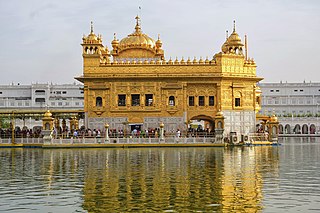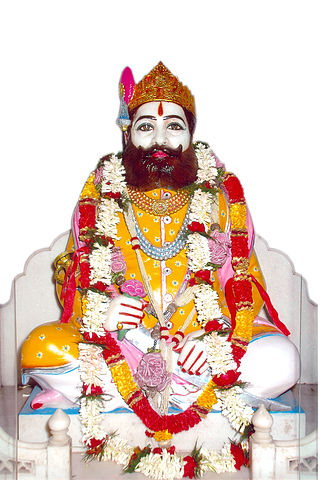
Singh is a title, middle name or surname that means "lion" in various South Asian and Southeast Asian communities. Traditionally used by the Hindu Kshatriya community, it was later mandated in the late 17th century by Guru Gobind Singh for all male Sikhs as well, in part as a rejection of caste-based prejudice and to emulate Rajput naming conventions. As a surname or a middle name, it is now found throughout the world across communities and religious groups, becoming more of a generic, caste neutral, decorative name.
Bohra or Bora may refer to:
Pandey, Pande, or Panday is a surname found commonly among several different communities such as Kanyakubj Bahun and Chhetri communities of Nepal and Saryupareen and Kanykubj Brahmins in India.Not all Pandey are Brahmins; As per India constitution for lower caste many people with Pandey surname receive Caste Quota benifits in India.
Dhillon is a Jat clan found in the Punjab region.
Das is a common last name in South Asia, among adherents of Hinduism and Sikhism, as well as those who converted to Islam or Christianity. It is a derived from the Sanskrit word Dasa meaning servant, devotee, or votary. "Das" may be inferred to be one who has surrendered to God. The surname is often used by those in the Vaishnav community.

Indian Sikhs number approximately 21 million people and account for 1.7% of India's population as of 2011, forming the country's fourth-largest religious group. The majority of the nation's Sikhs live in the northern state of Punjab, which is the only Sikh-majority administrative division in the world.
Kalsi is a famous Tribe of Tarkhan Sikhs also known as Ramgarhia Sikhs.
Karki (Devanagari:कार्की) is a Nepali/Kumaoni surname found among the Chhetri community of Nepal and the Kumaoni Rajput community of Uttarakhand. Karki was a government title in the medieval Khasa Kingdom. The tax collecting officers in Dara/Garkha had the title of Karki. The Karki clan of Kumaon claims to have descended from the family of the Rana of Chittorgarh. They are Rajputs of the Sun clan, and they came to Kumaon during the time of the Katyuri kings.
Giri is an Indian surname, which literally means hill. It is subcaste of Goswami Brahmin or Gosains Caste. Giri is among the 10 surname of goswami community Bharti, Giri, Puri, Saraswati, Aashram, Parvat, Sagar, Van, Aranya, tirth. The surname is also found among Mahishya and some other communities of Bengal.
The Sikhs are adherents to Sikhism, the fifth largest organized religion in the world, with around 25 million adherents. Sikh History is around 500 years and in that time the Sikhs have developed unique expressions of art and culture which are influenced by their faith and synthesize traditions from many other cultures depending on the locality of the adherents of the religion. Sikhism is the only religion that originated in the Punjab region with all other religions coming from outside Punjab. All the Sikh gurus, many saints, and many of the martyrs in Sikh history were from Punjab and from the Punjabi people. Punjabi culture and Sikhism are mistakenly considered inseparably intertwined. "Sikh" properly refers to adherents of Sikhism as a religion, strictly not an ethnic group. However, because Sikhism has seldom sought converts, most Sikhs share strong ethno-religious ties, therefore it is a common stereotype that all Sikhs share the same ethnicity. Many countries, such as the U.K., therefore misconcievingly recognize Sikh as a designated ethnicity on their censuses. The American non-profit organization United Sikhs has fought to have Sikhs included on the U.S. census as well, arguing that Sikhs "self-identify as an 'ethnic minority'" and believe "that they are more than just a religion".

Agrahari, Agraharee or Agarhari is an Indian and Nepali Vaishya community, They are the descendants of legendary king Agrasena. Predominantly, they are found in the Indian state of Uttar Pradesh, Madhya Pradesh, Jharkhand, Chhattisgarh and Terai region of Nepal.
Tandon is a surname found among Hindu Khatris and Sikhs of Punjab, India.
Chand means Moon in Hindi.
Agrahari Sikh is a Sikh community found in Eastern India that includes the States of West Bengal, Bihar and Jharkhand.
Sitaram Agrahari is a Nepalese journalist, poet and editor-in-chief of Gorkhapatra, Nepal's oldest daily newspaper. He received Rajarshi Janak Award in 2011 for his contribution in Hindi poetry and fiction.
Sandhu or Sindhu is a Jat clan or family name found among the Jats in India and Pakistan, mostly in the Punjab and Haryana regions.
Hinduism is the majority religion in Jharkhand, followed by nearly 67.83% of total population as of 2011 census. There has also been a significant population of followers of Islam and Sarnaism, with 14.53% and 12.52% respectively and Christianity being a significant minority, followed by 4.3%. A small numbers of Sikhs and other religion are also present.
Amrita literally means "immortality" and is often referred to in ancient Indian texts as nectar or ambrosia and carries the same meaning.
This page is based on this
Wikipedia article Text is available under the
CC BY-SA 4.0 license; additional terms may apply.
Images, videos and audio are available under their respective licenses.


